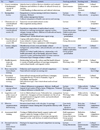Abstract
Purpose
With the increase of foreigners using Korea health facilities, it is important for nurses to be culturally competent. Thus, the purpose of this study was to examine the effects of a cultural competence educational program on the cultural competence of nursing students.
Methods
A quasi-experimental study with a non-equivalent control group pretest-posttest design was used. For the experimental group there were 42 participants from one school and for the control group, 40 from another school. The experimental group participated in the 14 week multicultural nursing education program while the control group participated later after the experiment was finished. Data were collected using self-report structured questionnaires prior to the intervention and right after the intervention, and were analyzed using descriptive statistics, χ2 test, and independent t-test with SPSS 18.0 program.
Figures and Tables
References
1. Kang HY, Han SY. A study on social distance of nursing students toward minority groups in a metropolitan city. J Korean Public Health Nurs. 2013; 27(1):166–178. DOI: 10.5932/JKPHN.2013.27.1.166.
2. Korea Immigration Service. Korea immigration service statistics 2014 [Internet]. Gwacheon: Ministry of Justice;2014. cited 2014 August 20. Available from: http://www.immigration.go.kr/HP/COM/bbs_003/ListShowData.do?strNbodCd=noti0096&strWrtNo=128&strAnsNo=A&strOrgGbnCd=104000&strRtnURL=IMM_6050&strAllOrgYn=N&strThisPage=1&strFilePath=imm.
3. Ministry of Public Administration and Security. Statistics on foreign residents by local governments in 2012 [Internet]. Seoul: Author;2012. cited 2012 February 8. Available from: http://www.mospa.go.kr/frt/bbs/type001/commonSelectBoardArticle.do?bbsId=BBSMSTR_000000000014&nttId=35593.
4. Kim JW. Health status and medical service utilization of migrant workers in Korea [master's thesis]. Seoul: Yonsei University;2008.
5. Koh CK, Koh SK. Married female migrants' experiences of health care services. J Korean Acad Soc Nurs Educ. 2009; 15(1):89–99. DOI: 10.5977/JKASNE.2009.15.1.089.
6. Cha SJ. Unmet health care needs of marriage migrant women in Korea [master's thesis]. Seoul: Seoul National University;2012.
7. Campinha-Bacote J. The process of cultural competence in the delivery of healthcare services: A model of care. J Transcult Nurs. 2002; 13(3):181–184. discussion 200-201. DOI: 10.1177/10459602013003003.
8. Chae DH, Lee CY. Development and psychometric evaluation of the Korean version of the cultural competence scale for clinical nurses. Asian Nurs Res. 2014; 8:305–312. DOI: 10.1016/j.anr.2014.06004.
9. Campinha-Bacote J. Becoming culturally competent in ethnic psychopharmacology. J Psychosoc Nurs Ment Health Serv. 2007; 45(9):27–33.
10. Giger JN, Davidhizar R, Punell L, Harden JT, Strickland OL. American Academy of Nursing expert panel report: Developing cultural competence to eliminate health disparities in ethnic minorities and other vulnerable populations. J Transcult Nurs. 2007; 18(2):95–102. DOI: 10.1177/1043659606298618.
11. Cross TL, Benjamin MP, Isaacs MR. Towards a culturally competent system of care: A monograph on effective services for minority children who are severely emotionally disturbed. Washington, DC: CASSP Technical Assistance Center, Georgetown University Child Development Center;1989.
12. Papadopoulos I. The Papadopoulos, Tilki and Taylor model of developing cultural competence in nursing. J Health Soc Environ Issues. 2003; 4(1):5–7. DOI: 10.5172/conu.673.28.1-2.129.
13. Caffrey RA, Neander W, Markle D, Stewart B. Improving the cultural competence of nursing students: Results of integrating cultural content in the curriculum and an international immersion experience. J Nurs Educ. 2005; 44(5):234–240.
14. Schim SM, Doorenbos AZ, Miller J, Benkert R. Development of a cultural competence assessment instrument. J Nurs Meas. 2003; 11(1):29–40.
15. Park MH, Park EA. Effect of cultural competence education for nurse. Multicult Educ Stud. 2013; 6(2):115–133.
16. Han SY, Cho Chung HI. Development of cultural competence scale for nursing students. J Korean Acad Nurs. 2015; 45(5):684–693. DOI: 10.4040/jkan.2015.45.5.684.
17. Kim SH. Development of education program for cultural competence in nursing for nursing students and its effects. J Korean Acad Soc Nurs Educ. 2013; 19(4):580–593. DOI: 10.5977/jkasne.2013.19.4.580.
18. Oh WO. Factors influencing cultural sensitivity among nursing students. J Korean Acad Child Health Nurs. 2011; 17(4):222–229. DOI: 10.4094/jkachn.2011.17.4.222.
19. Jeffreys MR. Teaching cultural competence in nursing and health care. 2th ed. New York, NY: Springer Publishing Company;2010.
20. Brathwaite AC, Majumdar B. Evaluation of a cultural competence educational programme. J Adv Nurs. 2006; 53(4):470–479. DOI: 10.1111/j.1365-2648.2006.03742.x.
21. Douglas MK, Pierce JU, Rosenkoetter M, Pacquiao D, Callister LC, Hattar-Pollara M, et al. Standards of practice for culturally competent nursing care: 2011 update. J Transcult Nurs. 2011; 22(4):317–333. DOI: 10.1177/1043659611412965.
22. American Association of Colleges of Nursing. Tool kit resources for cultural competent education for baccalaureate nurses. 2008. 08. Retrieved June 20, 2012. http://www.aacn.nche.edu/education-resources/toolkit.pdf.
23. Peek EH, Park CS. Effects of a multicultural education program on the cultural competence, empathy and self-efficacy of nursing students. J Korean Acad Nurs. 2013; 43(5):690–696. DOI: 10.4040/jkan.2013.43.5.690.
24. Park JS. Study on cultural competence of nurses working in general hospital [master's thesis]. Daegu: Keimyung University;2011.
25. Chae DH, Park YH, Kang KH, Lee TH. A study on affecting cultural competency of cultural competence of general hospital nurses. J Korean Acad Nurs Adm. 2012; 18(1):76–86. DOI: 10.11111/jkana.2012.18.1.76.
26. Yang SY, Lim HN, Lee JH. The study on relationship between cultural competency and empathy of nursing students. J Korean Acad Soc Nurs Educ. 2013; 19(2):183–193. DOI: 10.5977/jkasne.2013.19.2.183.
27. Park MS, Kweon YR. Effects of a cultural competence promotion program for multicultural maternity nursing care: casebased small group learning. J Korean Acad Nurs. 2013; 43(5):626–635. DOI: 10.4040/jkan.2013.43.5.626.
28. Cha YR, Yang SJ. Factor related to cultural competence among baccalaureate nursing students in Korea. Health Nurs. 2014; 26(2):13–26.
29. Hwang SD, Im H, Yun SH. Testing the effectiveness of multicultural education program. Korean J Soc Welf. 2012; 64(1):125–150.
30. Jeffreys MR, Dogan E. Evaluating cultural competence in the clinical practicum. Nurs Educ Perspect. 2013; 34(2):88–94. http://libproxy.chosun.ac.kr/4fb4e16/_Lib_Proxy_Url_Https/www.ncbi.nlm.nih.gov/pubmed/23763021.




 PDF
PDF ePub
ePub Citation
Citation Print
Print







 XML Download
XML Download